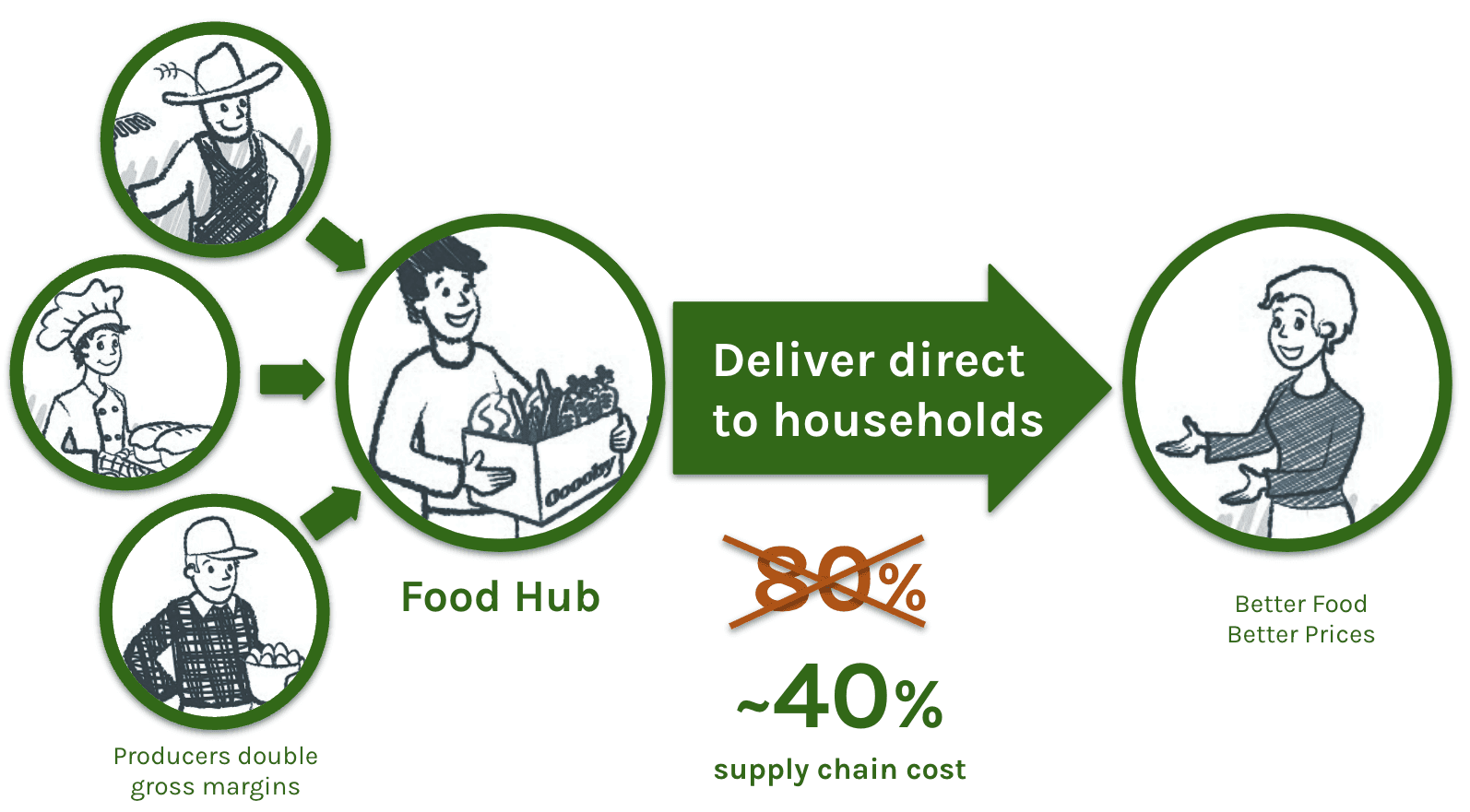Food hubs represent the future of food retail as more and more food shopping moves online.
A growing number of food hubs are popping up in towns and cities everywhere because they offer a very efficient way to sell and deliver high quality food at affordable prices.
The Problem

Food Hubs are the Solution

What is a Food Hub?
A Food Hub is a business operation that sells local food online and then handles all the packing, deliveries and customer service. There are two standard types of Food Hubs. Farm-based Hubs and Off-farm Hubs.
Farm-based Hubs - In many cases, Food Hubs are farm-based and run from a barn or farm building. In these cases the farm is usually selling its own produce straight from the field as well as sourcing other food items from neighbouring farms or nearby food producers such as local bakeries or micro-dairies.
Off-farm Hubs - Off-farm Hubs are typically run from a stand alone building in a village or town. These hubs don't produce anything themselves and focus entirely on running the sales, packing and deliveries on behalf of local producers.
This basic guide will give a general overview of the typical considerations, actions and costs involved in starting a local food hub.
The actual costs of setting up a food hub can vary significantly based on factors such as location, size of the operation, product selection, and market demand.
Assuming that you’re starting with the aim of around 50 - 100 customers to begin with, you can expect the startup costs to be within the range of £2k - £20k depending on what you already have on hand.
Research and Planning
Identify your target market and assess the demand for locally-sourced food in your area.
Research existing competitors and understand their strengths and weaknesses.
Create a business plan outlining your goals, strategies, and financial projections.Legal Structure and Permits
Decide on a legal structure for your business (e.g., sole trader, partnership, limited company, cooperative, CIC) and register it.
Research and obtain the necessary licences and permits to operate a food hub and comply with health and safety regulations.Sourcing Suppliers and Products
Build relationships with local farmers, producers, and suppliers to source a diverse range of fresh, local products.
Ensure that the products meet quality standards and have proper labelling.
Purchase opening inventory. £500-£1kInfrastructure and Facilities
Choose a suitable location for your food hub with adequate storage, refrigeration, and packing facilities. £50-£1k/mth
Invest in equipment like refrigeration, packaging materials, scales, tables, shelving, printer, labels and a vehicle £1k - £15kE-commerce Platform
Set up on the Ooooby platform to sell your products online and organise all your packing and deliveries. £350 setup + 2.5% of sales
Set up card payment facility 1% of salesMarketing and Branding
Develop a strong brand identity that emphasises the value of locally-sourced food. £0-£1k
Use digital marketing strategies like social media, email campaigns, and content marketing to reach your target audience.
Create simple brochures for a letterbox drop and community noticeboards £50-£500
Set up a stand at local events £50-£500
Go door-to-door introducing yourself as a local food hub with a sign up now incentiveDelivery and Logistics
Ooooby has an automatic routing system to optimise your deliveries.
Use a van or cargo bike to deliver the orders.
Consider partnering with local delivery services.
APPROXIMATE TOTAL anywhere from £2k - £20k
Now, let’s take a look at some simple economics based on 100 customers with a £20 average weekly order value.
This will generate around £8,000 in revenue per month.
A gross margin of ~50% on fresh produce is fairly typical (much more than that if you grow it yourself) and around 25%-30% on pantry and chilled items such as bread, milk, eggs etc.
Assuming 80% of your sales are fresh produce and 20% are pantry or chilled, then the average gross margin is ~45%.
That’s £3,600 gross margin per month which pays for rent, cost of the boxes, printing for paperwork, van running costs and your labour.
This size operation can be handled by 1 person working hard full time or 2 - 3 people hustling part time.
This is your baseline from where you can work to increase your average order value by expanding your range and increase your customer numbers by increasing your marketing efforts or expanding your delivery zones.
Check out this article Success Metrics for Small Farms and Food Hubs on Ooooby to give you an idea of the average and median sales and revenue results that Food Hubs running on Ooooby are achieving.
If you would like to know more about how Ooooby can help you set up your own Food Hub, you're very welcome to Book a Demo. We'll listen to what you would like to do and show you how the Ooooby system can help.


